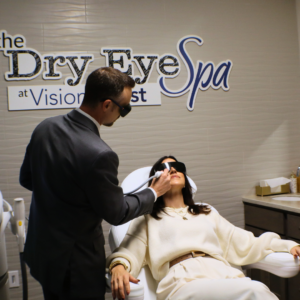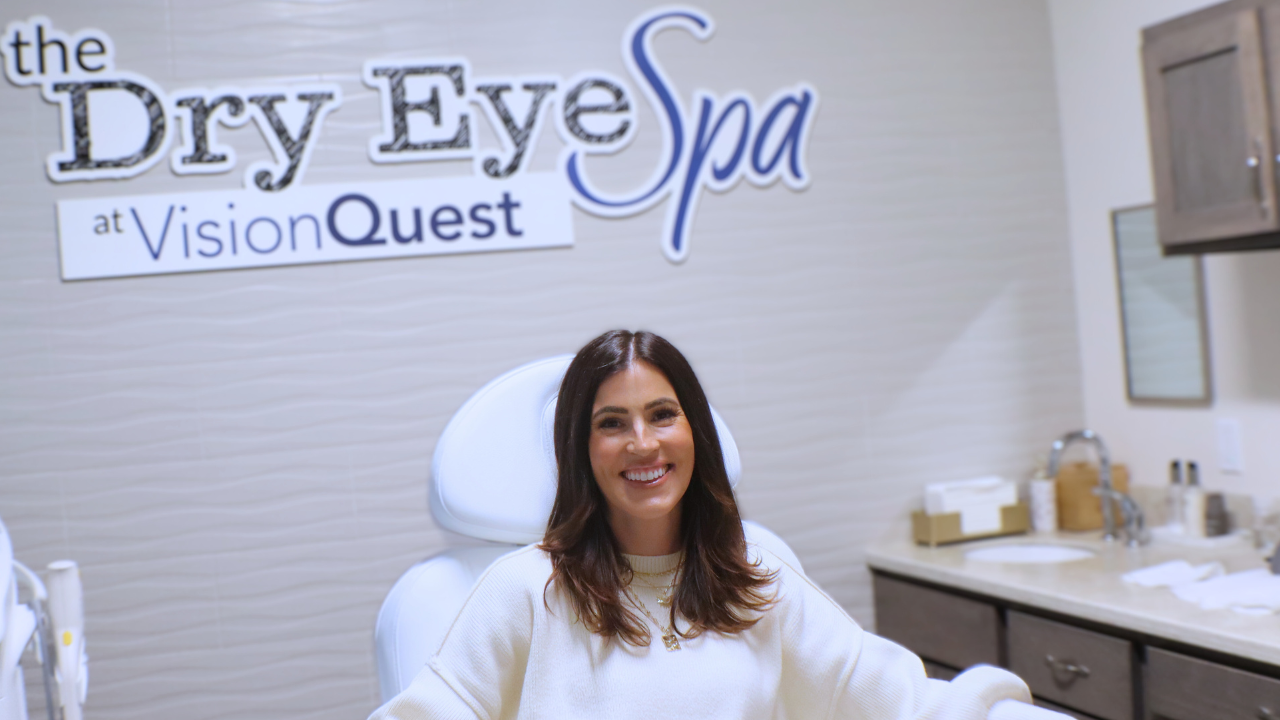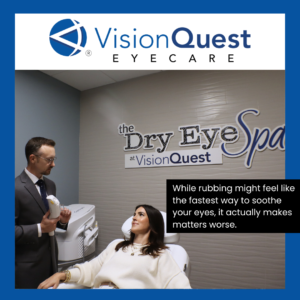Rubbing your eyes can feel like second nature—especially when they’re dry, itchy, or irritated. But while it may offer a moment of relief, it’s a habit that can cause more harm than good. In fact, frequent eye rubbing can lead to long-term damage that affects your vision and overall eye health.
If you find yourself rubbing your eyes often, it may be time to look deeper into what’s causing the irritation. At VisionQuest Eyecare, we work with adults every day who experience dry, itchy, or sensitive eyes—and the good news is that help is available.
Why Your Eyes Feel Itchy or Irritated
The urge to rub usually stems from an underlying issue. Common triggers include:
- Dry eye syndrome – Often caused by insufficient tear production or poor tear quality.
- Allergies – Pollen, pet dander, dust, and mold can all inflame the eyes.
- Foreign particles – A speck of dust or debris under the eyelid can cause discomfort.
While rubbing might feel like the fastest way to soothe your eyes, it actually makes matters worse. Your eyes have their own natural defense system—tears. They’re designed to flush out irritants and keep your eyes hydrated. Artificial tears or prescription eye drops can support this process, but rubbing interrupts it and introduces new risks.
How Rubbing Harms Your Eyes
You might be surprised to learn just how damaging frequent eye rubbing can be. Here’s what happens behind the scenes:
- Corneal scratches: If you rub your eyes while a small particle is trapped under your lid, you can scratch your cornea—a painful injury that may require medical attention.
- Increased inflammation: Rubbing stimulates the release of histamines, which are chemicals that make allergy symptoms worse. So instead of soothing your eyes, rubbing can actually intensify the irritation.
- Dark circles: Repeated pressure on the delicate skin around your eyes can break tiny blood vessels, leading to under-eye discoloration that’s tough to reverse.
- Germs and infection: Even clean hands carry bacteria. When you rub your eyes, you risk introducing bacteria into the eye, increasing the chances of infections like conjunctivitis (pink eye).
- Vision-altering conditions: Over time, frequent rubbing can contribute to a condition called keratoconus, where the cornea thins and changes shape. This can lead to blurred vision and may not be fully correctable with glasses or contacts.
A Better Way: Treat the Root Cause
If you’re rubbing your eyes on a regular basis, that’s a sign your eyes need professional care—not just temporary relief.
At VisionQuest Eyecare, we offer personalized care for dry eye syndrome and other sources of chronic eye irritation. Our team uses advanced diagnostic tools to evaluate your tear film, identify triggers, and recommend effective treatments that bring lasting comfort.
Treatment may include:
- Prescription or over-the-counter lubricating drops
- Lifestyle adjustments to reduce exposure to allergens
- In-office therapies to improve tear production
- Nutritional guidance to support eye health
The key is to treat the cause—not just the symptoms.
When to See an Eye Doctor
It’s time to schedule an appointment if:
- You find yourself rubbing your eyes every day
- Your eyes feel dry, gritty, or sensitive to light
- You experience frequent redness or watering
- Vision is blurry or fluctuates during the day
These symptoms are common with dry eye syndrome and other treatable conditions. Our team at VisionQuest Eyecare can help you find relief and protect your long-term vision.
Your Eyes Deserve Better Than a Quick Fix
Rubbing your eyes might seem harmless, but it’s a habit that can have serious consequences. With the right care, you can break the cycle of irritation and find real, lasting relief.
If your eyes feel dry, itchy, or uncomfortable, don’t ignore the signs. Schedule a consultation with VisionQuest Eyecare in Greenwood or Fishers and let us help you protect your vision—without the harmful habit of rubbing.

Dr. Anjali Shah is an optometrist at VisionQuest Eyecare with a passion for helping others. She graduated from the State University of New York College of Optometry, with advanced training in pediatrics and ocular diseases through her internship and residency. She is a national speaker in the field of myopia management, qualified to prescribe advanced myopia management treatments to slow the condition’s progression.


